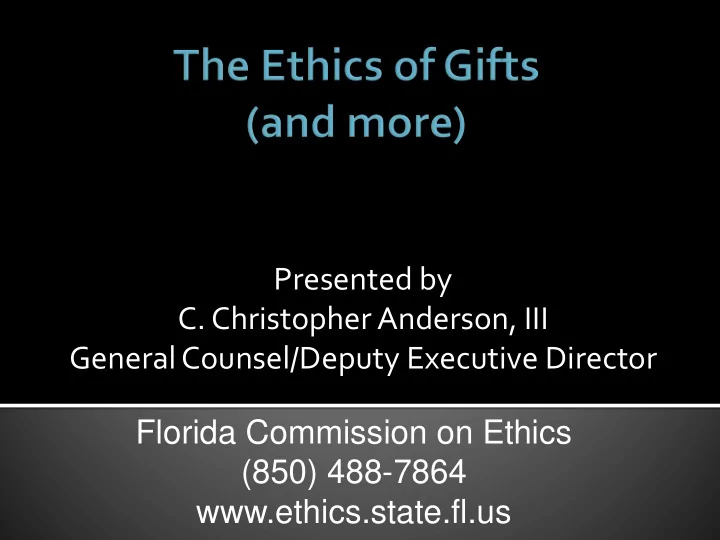

Presented by C. Christopher Anderson, III General Counsel/Deputy Executive Director Florida Commission on Ethics (850) 488-7864 www.ethics.state.fl.us
NOT ADMINISTERED BY COE ADMINISTERED BY COE F.S. 112.313(2)—solicitation or F.S. 838.015--bribery acceptance with F.S. 838.016--unlawful understanding compensation or reward for F.S. 112.313(4)—unauthorized official behavior compensation F.S. 11.045(4)(a)-- F.S. 112.3148—THE gift law expenditures to Legislators F.S. 112.31485—political and Legislative employees committee gifts F.S. 944.717—DOC F.S. 112.3149—honoraria and employees, related expenses solicitation/acceptance F.S. 112.3215(6)—executive from bidders/vendors branch expenditures F.S. 334.195-FDOT F.S. 350.041(2)—additional 18 U.S.C. Sections 1341, standards for PSC members 1343, 1346--Federal “Honest Services Fraud”
Public officers/employees (state/local) Local government attorneys Candidates Members of privately-operated charter school governing boards Independent contractor chief administrative/ executive officers/employees of a political subdivision.
No public officer, employee of an agency, local government attorney, or candidate for nomination or election shall solicit or accept anything of value to the recipient, including a gift, loan, reward, promise of future employment, favor, or service, based upon any understanding that the vote, official action, or judgment of the public officer, employee, local government attorney, or candidate would be influenced thereby. Applies to all of the persons listed in slide, above. See F.S. 112.313(2) itself, and see F.S. 112.3136 and F.S. 1002.33. Involves a quid-pro-quo. Is analogous to bribery.
UNAUTHORIZED COMPENSATION.—No public officer, employee of an agency, or local government attorney or his or her spouse or minor child shall, at any time, accept any compensation, payment, or thing of value when such public officer, employee, or local government attorney knows, or, with the exercise of reasonable care, should know, that it was given to influence a vote or other action in which the officer, employee, or local government attorney was expected to participate in his or her official capacity.
Applies to acceptance of things by public officers, public employees, local government attorneys, and their spouses and minor children. Addresses both actual and constructive knowledge situations. Requires a “reality check” (ask yourself one question . . . .). Commission on Ethics v. Barker, 677 So. 2d 254 (Fla. 1996).
Applies to “reporting individuals,” state and local; and to “procurement employees” (who exist only at the state level): RIPEs. Has anti-solicitation provisions, prohibition-of- acceptance provisions, and reporting provisions. Defines “gift” in detail—F.S. 112.312(12). Prohibitions geared to gifts from “lobbyists, ”vendors,” “political committees,” etc.
A RIPE cannot solicit a gift, regardless of value, from a “lobbyist” who lobbies his agency, a “vendor,” or a “political committee,” or from persons or entities connected to such donors, if the gift is for the personal benefit of the RIPE, another RIPE, or immediate family of either. CEO 91-52 (bird sanctuary donations), and CEO 95-25 (community college donations).
A RIPE cannot accept, directly or indirectly, a gift from a lobbyist, or certain others, valued at over $100. Exception for gifts accepted for government entities or charitable organizations. But see the Commission on Ethics’ final order in In re Robert J. MaJka, Jr., Complaint No. 03-080. Reporting an unacceptable gift will not cure its unacceptability.
Rule 34-13.310(6), Florida Administrative Code—Commissions’ indirect gift rules. CEO 99-6 (Republican Party holding fundraiser at Disney World). CEO 08-2 (Attorney General appearing in public service announcements).
F.S. 112.3148(7). Rules 34-13.500 and 34-13.510, F.A.C. General or default valuation is “actual cost to the donor.” A gift provided by multiple donors is valued differently for donee reporting than for donor reporting and prohibited acceptance. 90-day pay down (derived from definition of “gift” in F.S. 112.312(12)(a). CEO 95-36 (particular Orlando Magic tickets).
Gifts over $100, from any donor, other than from “lobbyists,” “relatives,” or certain other sources, must be reported quarterly on CE Form 9 (filed with the Commission on Ethics). F.S. 112.3148(8). Gifts over $100, from certain government entities and from direct-support organizations specifically authorized by law to support a government entity, must be reported annually (on or before July 1) on CE Form 10 (RIs file where file annual financial disclosure, PEs file with the Commission) . F.S. 112.3148(6).
Lobbyists, and certain other donors, must report gifts between $25 and $100 they give to RIPEs, quarterly on CE Form 30 (filed with the Commission). F.S. 112.3148(5)(b). The above donors must notify an intended recipient, at the time a gift if made, that the gift will be reported on CE Form 30. F.S. 112.3148(5)(b). Form 10 donors provide a statement to Form 10 donees, by March 1. F.S. 112.3148(6)(c).
F.S. 112.31485 New via CS SB 2 (Chapter 2013-36, L.O.F.)
Applies to RIPEs. Like F.S. 112.3148, is geared to “lobbyists,” “vendors,” “political committees,” and certain others. Unlike F.S. 112.3148, has no $ threshold. “Honorarium” means a payment of money or other value for an oral presentation or writing. Cannot solicit, from anyone, an honorarium related to public duties. Cannot accept an honorarium from a lobbyist, etc. Can accept actual and reasonable expenses. Reportable on CE Form 10, if from a lobbyist, etc.
Prohibits “expenditures” to RIs (not also to PEs) of the executive branch of state (not local) government. CEO 08-19. An “expenditure” is a payment or similar thing, made by a lobbyist or his principal, for the purpose of lobbying. F.S. 112.3215(1)(d). “Lobbyist” defined differently than in gift or honoraria laws. No $ thresholds. CEO 06-17.
Please feel free to telephone, write, or fax staff of the Florida Commission on Ethics if you have any questions. (850) 488-7864, telephone. (850) 488-3077, fax. www.ethics.state.fl.us ,website (provides U.S. Mail address, and more)
Recommend
More recommend